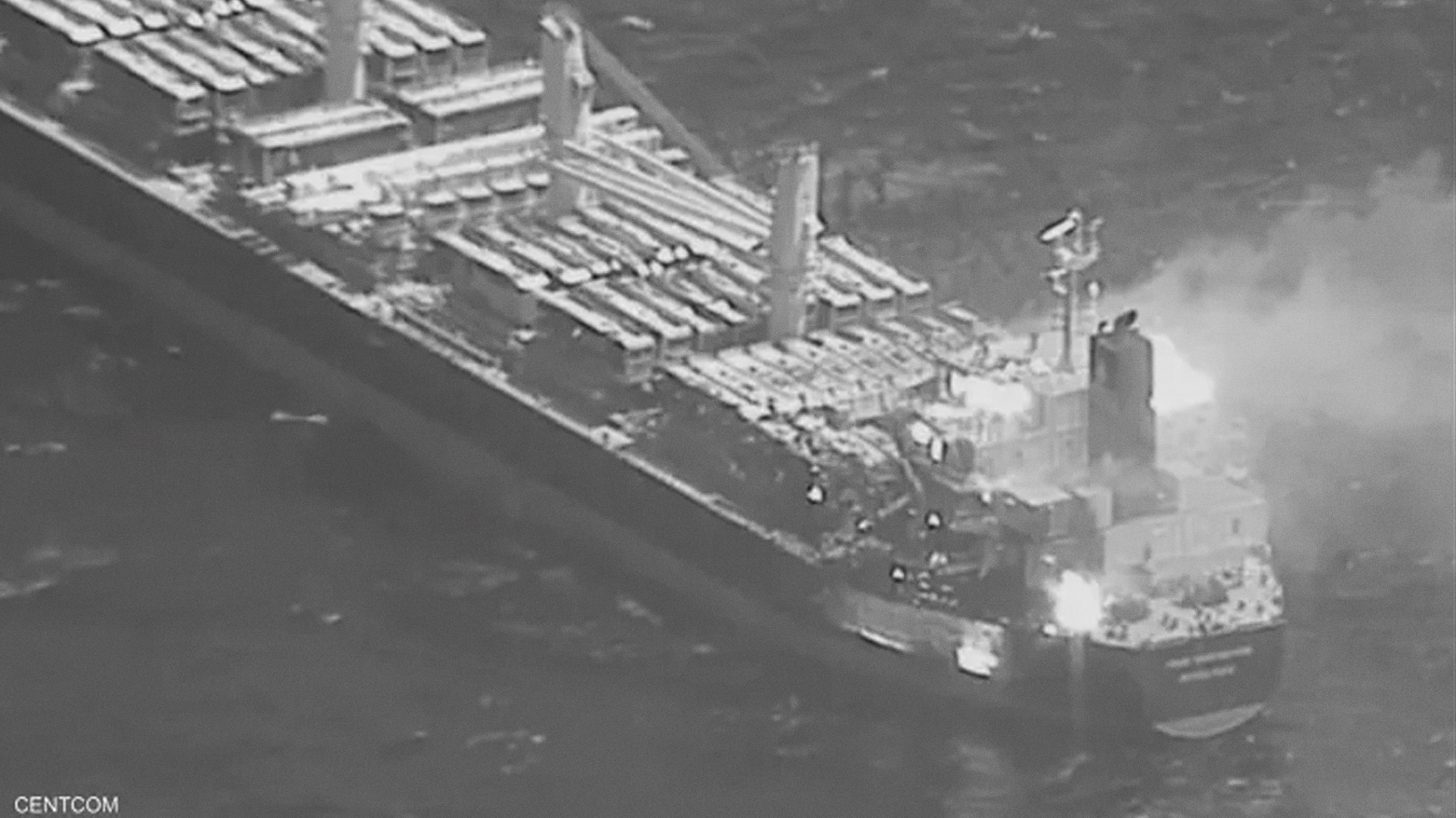U.S. Condemns Lethal Houthi Attacks—but Response is Limited
The Biden administration remains narrowly focused on the Houthis, while largely turning a blind eye to Iran’s role in their attacks.

WASHINGTON DC, United States (Kurdistan 24) – On Wednesday, the Iranian-backed Houthis in Yemen launched their first lethal attack on Red Sea shipping, killing three civilian crew members of a commercial vessel in the Gulf of Aden.
The ship, the MV True Confidence, was Liberian-owned and flagged in Barbados. It was carrying steel from China to the Saudis’ Red Sea port of Jeddah.
One Vietnamese and two Filipino crew members were killed as a result of the Houthis’ attack, while another two Filipino crew members suffered serious injuries, the ship’s owners said.
The event had nothing to do with the war in Gaza between Israel and Hamas! Yet a Houthi spokesman, dressed in military fatigues and acting as if he represented a major military power, announced— on camera and rather loudly—that the Houthis had successfully struck a ship in the Gulf of Aden in support of the Palestinians.
Yemen is a poor, impoverished country. It ranks 168 out of 177 countries on the U.N.’s Human Development Index. Close to half of Yemen is illiterate—they can neither read nor write.
Such statements, as those made by the Houthi spokesman, are believed among Yemenis, and the Houthis’ assaults on international shipping have actually made them more popular in the country!
Yet their attacks could not be conducted without Iranian support. Last month, the Defense Intelligence Agency released a report detailing Tehran’s provision of sophisticated arms to the Houthis going back to 2015.
Read More: U.S. Intelligence: Iran Supplying Houthis with Missiles, Drones
Nonetheless, the Biden administration remains narrowly focused on the Houthis, while largely turning a blind eye to Iran’s role in their attacks.
Above all, an Iranian spy ship, the Behshad, provides the Houthis with the data to target international shipping. Yet the U.S. does not threaten the Iranians with anything, beyond economic sanctions.
The U.S. could demand that the attacks stop, or it will sink the Behshad or any other ship providing crucial support for the Houthis’ assaults. But that simply does not happen.
Increased Houthi Attacks
Wednesday’s attack marked the fifth time in two days that the Houthis fired an anti-ship ballistic missile (ASBM) at international shipping, a CENTCOM statement explained.
“Two of these ASBMs impacted two shipping vessels—M/V MSC Sky II and M/V True Confidence—and one ASBM was shot down by USS Carney,” a U.S. Navy guided-missile destroyer.
Houthis Kill Innocent Civilians with Missile Attack
— U.S. Central Command (@CENTCOM) March 6, 2024
At approximately 11:30 a.m. (Sanaa time) Mar. 6, an anti-ship ballistic missile (ASBM) was launched from Iranian-backed Houthi terrorist-controlled areas of Yemen toward M/V True Confidence, a Barbados-flagged, Liberian-owned… pic.twitter.com/W1H0GP4Y6i
Limp Biden Administration Response
Asked on Wednesday about the Houthis’ attack on the True Confidence, White House Press Secretary Karine Jean-Pierre noted that the vessel “was not a U.S. ship, contrary to what the Houthis claimed.”
Asked “if the U.S. is readjusting its military strategy against the Houthis in response to [Wednesday’s] deadly incident,” she seemed to suggest no.
“We believe that we have been able to degrade their capabilities in the actions that we’ve taken,” Jean-Pierre responded, oblivious to the near-certainty that Iran would resupply them.
“But it is not just our problem,” she continued. “This is an international one. So we are working in a multinational coalition to deal with what we’re seeing currently by the Houthis.”
Subsequently another journalist asked, “Why is the U,S Navy having so little effect on stopping these kinds of attacks?”
All Jean-Pierre could do was to repeat herself. The U.S. had “degraded their capabilities,” and “we will continue to act as needed to degrade the Houthis’ capabilities.”
She did not say that the U.S. aim was to stop the Houthis’ attacks or to deter them, but merely to “degrade” their capabilities. And, of course, there was no warning to Iran.
At the State Department, the Spokesperson, Matthew Miller, spoke similarly. Asked about the Houthis’ attack, he responded, “We will continue to hold them accountable, and we call on governments around the world to do the same.”
How does the U.S. hold the Houthis accountable? That was never clearly explained, and, of course, nothing about Iran.
Thus, it seems unlikely that the U.S. response, at least as explained so far, will do very much to prevent the Houthis’ next attack on international shipping.